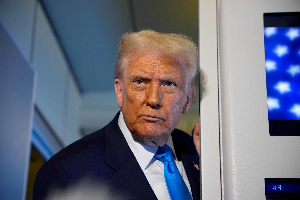Opinions of Wednesday, 26 February 2020
Columnist: David Ignatius, Washington Post
Hosni Mubarak’s death evokes the paradox and pain of the Middle East
Former Egyptian president Hosni Mubarak died Tuesday, nearly a decade after he was toppled in a chaotic coup that broke his iron rule but didn’t provide Egypt with a dynamic, post-Mubarak identity.
Mubarak has been a forgotten man in recent years, but his death evokes the paradox and pain of the Middle East. He governed Egypt for nearly 30 years, a modernizing despot who kept peace with Israel and liberalized the economy but balked at dismantling the military dictatorship and police-state tactics that had spawned him.
The revolt against Mubarak in early 2011 was the apogee of the “Arab Spring” movement; an idealistic President Barack Obama helped push him out the door, a move that Saudi Arabia and other conservative Arab states never forgave. He was succeeded by a military-led committee, then a Muslim Brotherhood government headed by Mohamed Morsi, then by a backlash counter-coup that installed Gen. Abdel Fatah al-Sissi, a former head of military intelligence who governed with even less charisma than Mubarak.
Through this tormented saga, the United States seemed to keep making mistakes — encouraging Mubarak’s ouster in the streets after he agreed to leave office voluntarily; then trying to nursemaid a Muslim Brotherhood government that lacked the skills to govern; and finally backing a military takeover. By the end of this dizzying story, Egypt had moved from a country that loved America to one that bitterly resented U.S. tutelage.
It was a sign of Mubarak’s power that Egypt never seemed to fully recover its balance after his fall. So thoroughly did Mubarak dominate and suppress political life that, in the months after the 2011 Tahrir Square revolution, Egypt displayed a mix of euphoria and exhaustion, as if the nation were coming out of a trance. Mubarak’s imprint also survived in the military that still holds power, effectively, under Sissi’s presidency.
Mubarak was a stubborn man by nature, and an easy departure wasn’t in him. He clung to the job for years after U.S. officials began urging him to consider a transfer of power. The more he was pushed to leave, the more Mubarak dug in his heels. His last term as president began after a supposedly democratic election in 2005, his first such ballot. But those who dared challenge him at the polls, such as opposition candidate Ayman Nour, were bullied and arrested.
Still, if Mubarak had listened to critics and announced that he wouldn’t run again in 2011, he might have preserved a legacy as a ruler who created a more prosperous and open Egypt. But this concession wasn’t forced out of him until Feb. 1, after the Tahrir protests had reached critical mass.
Mubarak was an unlikely president, starting with his initial elevation to the post in October 1981 after the assassination of Anwar Sadat. It was widely rumored among Egyptians that the flamboyant Sadat had chosen the stolid ex-Air Force general as his vice president because it was implausible that Mubarak would ever be seen as a rival. A snickering nickname for him in those days came from a French brand of cheese: “La Vache Qui Rit,” or “the laughing cow.”
Mubarak seemed to recognize his vulnerability in his refusal to appoint a vice president of his own until his final days in power, when he named his intelligence chief, Gen. Omar Suleiman, to the post. His real plan, it was thought, was to engineer the succession of his son Gamal, but the father ultimately had to renounce Gamal’s ambitions, too.
That the unglamorous former military boss imagined he could create his own pharaonic line offended many Egyptians and added to the resentment. Mubarak remained committed to the 1979 peace treaty with Israel, but it was always a “cold peace.” He did business in private with Israeli and American leaders, even as he often kept them publicly at arm’s length. When Obama gave his famous Cairo speech in June 2009, he invited members of the Muslim Brotherhood, but not Mubarak.
A more positive element of Mubarak’s legacy was that, in his last decade in power, he appointed economic reformers, such as former prime minister Ahmed Nazif and former trade minister Rachid Rachid. Their free-market policies helped push Egypt’s growth rate above 5 percent. But it was a sign of the deep public anger toward anything touched by Mubarak that these economic reformers were attacked for alleged corruption after the dictator’s fall.
That was Mubarak’s curse: Even his good policies were unloved.
Business













